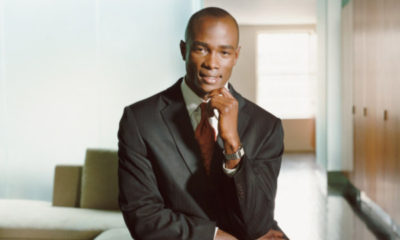News
Jide Alara: Our Unknown Enemy
 Various issues unfold everyday in Nigeria which demand attention to hold consistent public debates and discussions over engaging platforms. Since we are supposedly led by a democratic government, open dialogues about such topics naturally help develop our supposed democracy. From television to radio, virtual commentary to print media, informal activists to conspiracy analysts, it’s gladdening to see people talking. However, what’s sad amidst the gladness is the nihilistic operating system commonly used for analysis.
Various issues unfold everyday in Nigeria which demand attention to hold consistent public debates and discussions over engaging platforms. Since we are supposedly led by a democratic government, open dialogues about such topics naturally help develop our supposed democracy. From television to radio, virtual commentary to print media, informal activists to conspiracy analysts, it’s gladdening to see people talking. However, what’s sad amidst the gladness is the nihilistic operating system commonly used for analysis.
The situations addressed and solutions proffered tend to be void of our indigenous social systems – respect, culture, optimism – or simply put our identity. There is no doubt of Nigeria being abundantly blessed and (if you permit me to startle you up more) . Current indicators prove its visible development is nothing compared to the untapped advantage its diversity could bring.
Lagos is a typical example to this ideology. The complex nature of this city is often frowned upon – the hold-ups generated from congested traffic, the influx of city migrants, the high rate of unemployment etc. These three complex examples in a different view bring enormous advantage to the city and its dwellers.
The congested traffic of Lagos immediately delivers a market place where almost anything can be bought while in traffic without going to a market proper, thereby saving so much time and cost. The influx of migrants brings better accessibility to human resource needed for development and the high rate of unemployment catalyses individual empowerment born off expressions of inner talents frustrated out by idleness which in the long run, creates the identification of skills and jobs.
Most analysis and recommendations during public discourse are often promoted without a differentiating “contextualized” viewpoint of our endemic nature and circumstance. Following several discussions of this topic, I have begun to feel my ranting of the word in quote pays it no more respect.
Another partnership formed along this falsehood ‘non-contextual’ campaign damaging to us as a nation is the emotive and nihilistic orientation it precipitates. As solutions void of our aboriginal social systems are proffered during discuss and thereafter recommended for implementation, the result becomes a deeper failure, further raising more public venom and nihilism.
Various new media platforms are fast becoming a virtual communities, hosting well thought out articles by Nigerians who share crass opinions about societal issues. As platforms, they doing an amazing job creating more citizen participation and engagement but also liable to misrepresentation with the information they choose to disseminate for content.
I don’t know a lot about writing but I understand a bit about certain influencing factors of westernized sensitization that could further stifle contextual development and transformation. Some writers given responsibility to share public opinion commendably guide us towards sustainable development; while others don’t have a clue about the delicate line they privileged to tread upon. These “others” have misconstrued the role they fill and have sunk deep into thought of it being about their individuality and level of exposure to westernised standards.
In being modest, the realisation of obligation these blogs give some “columnists” is a very thin line to discern and competent of only a few. However, it is highly important because once its variation isn’t clear, the outcome could act as catalyst to de-orientating many youths towards the infesting emotiveness and nihilism mentioned in the third paragraph of this essay; as we repeatedly compare and indulge ourselves to western social systems.
Again, I reiterate, I don’t know jack about writing but would endless sermons of westernization truly give us the development we seek?
Adewale Ajadi wrote in his book Omoluabi 2.0:
“Our westernized education has produced a more simplistic survivalist version of the engineered western paradigm where we consciously endure this formal system and insert our more complex instinctive orientation unconsciously. This has had a disruptive effect on the evolution of a more complex, relevant and effective system of thinking and organisation necessary for the African environment.”
Omoluwabi 2.0 Pg. 43
We continue to masturbate the anticipation of ‘good governance’ yet, we do so bad in attitudinal foreplay in ensuring that our aboriginal social systems enjoy the much needed synergy with contemporary society to create a formula exclusive to Nigeria’s contextual development.
I’ve held discussions with individuals who fiercely argue that this isn’t the case. They claim the assertion to societal decay is justified by years of bad governance and crippled development. And, more often than none, blame is in the right direction. So, if you also hold this stance, be obliged to know you not alone, you have a bandwagon with you.
However, I believe an immoral or inefficient government can never survive the test of time if it had an organised coherent citizenry and public opposition responsibility.
The deterioration of our primordial social and cultural systems is what has stolen attention of our pathologies. How did we get here? The decay in our ancestral communal social system is responsible for the non-emergence of effective and efficient governing structures.
Emerging market economies like Singapore, India, China, and other developing Asia are examples to the success of this story. Their aboriginal social structure has been synergised with contemporary standards of governance to bring about development contextual for their existence.
Until we revisit our primitive models and synergise them with new public management for civilisation, development would only come when cocks grow teeth. We would only continue to rant and rebel the inefficiency of government to bring about the change we want.
Lastly, the recent coherent alliance which has been formed to be an opposition to the present Federal Government by three political parties – Action Congress of Nigeria, All Nigeria Peoples Party and Congress for Progressive change further gives hope to the need of citizens’ public opposition responsibility. The model by which the party was also formed comprising various interests and tribes clearly shows its vision to be an integrated equitable nationalist party. Some argue that it is a ticking time bomb but I believe if it survives, its premise would further challenge the consensus to create a more responsible citizenry.
I leave with you optimism, peace and love.
Photo Credit: 123rf.com
_________________________________________________________________________________
Jide Alara has a brainchild called DraggNation. DraggNation is dedicated to engagements for self-discovery in context of the Nigerian state with the hope it leads to individual empowerment that further accelerates societal/organisational transformation and community change. And, this is what I’m committed to asides being a realist and innovator.


















